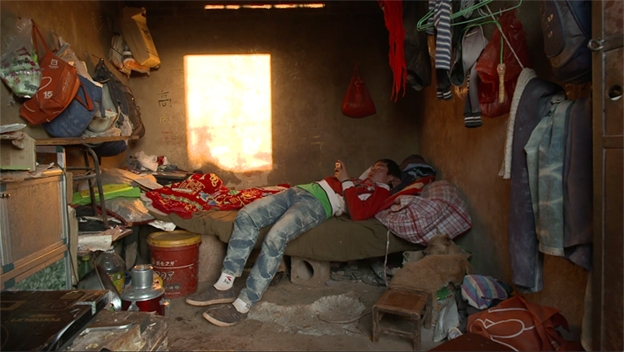The late Stan Brakhage was at pains to assert his Pittsburg Documents be understood as ‘documents’, not ‘documentaries’. His triptych of silent 16mm films observe (in his own words) the ‘mystical’ ‘bogeymen’ of his time – police, Eyes, doctors, Deus Ex and coroners, The Act of Seeing with One’s Own Eyes, (all films 1971, restored 2013). A set of subjective records of authoritarian institutions, the films gaze fleetingly upon city lights and the labouring hands of police, cut with frenetic energy and fluctuating focus upon a hospital’s workers and patients, and, in the difficult final film, offer the opened human body as a glistening and vulnerable landscape of vermillion organs and creamy fat, subject, upon death, to clinical measurement and aggressive rupture.
The Act… is like happy hour at a human butchers; a reduxed contemporary iteration of the physiological investigations of the enlightenment and the memento mori of the Renaissance. As documents these films become objects; formal syntheses of reality and its observer, material and form. Part of Doclisboa’s programme of over 250 films, Pittsburg Documents is a prime example of the festival’s expansive investigation into the documentation and broadcast of realities. Eyes also shows how different the popular American reality TV show Cops (1989 – present) might have been if it had been directed by an experimental filmmaker.
If Brakhage’s Eyes is an alternative Cops, Kurt Walker’s Hit 2 Pass (2014) is an alternative Pimp My Ride (2004–7). Opening in the visual language of MTV and video games, the film bromantically journeys from road movie to the amateur race-track for the eight cylinder Hit to Pass race in industrial Prince George, British Columbia, before boldly jump-starting as an ethnographic survey of ‘Canadian-ness’, and then as an exercise in abstraction.
The film is a compelling nuanced exercise in pure observation where ardour becomes empathy with the frame as a simple window onto a complex reality
Celebrated Chinese filmmaker Wang Bing’s Father and Sons (2014), previously included in his 2014 exhibition at Centre Georges Pompidou, could be seen as an alternative to Channel 4’s Gogglebox. For the majority of its 87 minutes, unusually short for Bing, the film, which won best feature in Doclisboa’s International Competition, focuses a fixed shot on the single bed of a shack a father lives in with his two sons, whilst labouring at a stonemasonry factory. The elder adolescent son, later joined by his brother, idly plays with his phone on the bed, as an out-of-shot TV fills the scene with sound. Drama pivots upon the moments dusk forces the boy to turn on the hut’s light and his one change of position, to charge his phone, before his father returns to the hut at the film’s conclusion and demands the TV is turned off.
This film is an exercise in time and waiting, watching and boredom, as we watch the protagonists watch the off-screen TV, mirroring one screen with another. For some, Father and Sons might be read as the nadir of experimental film – a long, arduous audience experience where nothing really happens. But when subjected to closer scrutiny, it’s a compelling nuanced exercise in pure observation where ardour becomes empathy with the frame as a simple window onto a complex reality. We can’t expect it to bump Benefits Street off UK TV station Channel 4’s schedules anytime soon, but imagine the world in which it did.
Watching Lav Diaz’s epic five hour From What Is Before (2014) is like binging on a slow-cinema version of a soap opera box set, as Diaz theatrically restages his native Philippines’ 1972 revolution. Daniel Hui’s Snakeskin (2014) similarly acts to revise the history of the director’s homeland, Singapore, ambitiously rejoicing in the medium of film as a Chris Marker-esque agent of time travel and mythmaking, complete with a reincarnated cat. A frequent subject of other’s documentaries, Ai Weiwei himself produced and directed Ai Weiwei’s Appeal ¥15,220,910.50 (2014), using the camera as a weapon for self-defence and attack in a Kafka-esque bureaucratic epic meticulously chronologising his 2012 incarceration and trial – a bittersweet You’ve Been Framed (1990–)? Staying in China, J.P Sniadecki’s The Iron Ministry (2014) offered a vital armpits-and-all social portrait of the country via the mobile microcosm of a journey on Chinese rail.
French artist and filmmaker Eric Baudelaire’s Jury Prize winning Letters to Max (2014) turned geopolitics into poetry, via the artist’s correspondence with the former foreign secretary of Abkhazia – a self-proclaimed independent territory in the ex-USSR, whose separatist autonomy most of the world doesn’t accept. An intimate exploration of recognition, independence and in/exclusion (alongside the magic of the postal service’s ability to deliver to a country that doesn’t formally exist), the film is also part of a larger project manifested in Baudelaire’s 2014 Secession Sessions exhibitions at Bergen Kunsthall and Bétonsalon, Paris. As such, the festival’s two major international prizes went to films originally seen in art or museum settings, perhaps an indicator of current crises in the funding and distribution of independent film, making Doclisboa’s bold, rigorous and experimental platform for diverse documents of reality an ever more real cause for celebration.
In festival co-director Cíntia Gil’s words Doclisboa is ‘Putting differences and different “nows” in proximity’. For 10 days the darkened auditoria of the festival offered a parallel zone in which reality film usurped reality TV, offering plural panoramas of the state of cinema and of the world.
See here for further information about Doclisboa’14
Online exclusive published 5 November 2014
